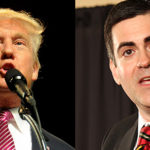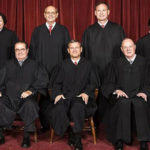Recent weeks must have been at least a little unsettling for Russell Moore, president of the Ethics & Religious Liberty Commission, the Southern Baptist Convention’s public-policy and advocacy agency.
 Jake Raabe
Jake Raabe
Late last month, former SBC Executive Committee Chairman William Harrell wrote a blog post criticizing Moore for his political activism and opposition to Donald Trump. Harrell also claimed to speak on behalf of “a number of pastors, particularly from larger churches, who are seriously considering escrowing their Cooperative Program funds until something is done.”
Soon after, the Louisiana Baptist Convention’s state news site, which featured a similar editorial earlier this year, linked to Harrell’s article. The subject subsequently came up at the Louisiana Baptist Convention annual meeting, where messengers overwhelmingly approved a measure to “study the recent actions of the SBC Ethics & Religious Liberty Commission with regard to issues of concern to Louisiana Baptists.” While this resolution is vague, it’s difficult not to read it in light of Harrell’s and Baptist Messenger editor Will Hall’s editorials calling for an end to Southern Baptist support of Moore and the ERLC due to his opposition to Trump and perceived hostility toward traditional conservative values.
 Moderating voice
Moderating voice
It would be naive to claim all of Moore’s political beliefs align perfectly with those of Southern Baptists at large. Speaking strictly in terms of politics, but not theology, Moore has been a consistent moderating voice in a convention that recently has been extremely conservative. However, silencing or dismissing Moore would be a grave mistake for Southern Baptists.
Again, Moore often is a dissenting voice within the SBC, a point both Harrell and Hall make in their calls for disassociation with the ERLC. Dissent is, however, a hallmark of Baptist history and identity. I’ve written before about the history of our denomination, which started as a persecuted group of dissenters from the Church of England. Historically, Baptists have striven to be a prophetic voice that stands apart from the dominant culture and calls it to faithfulness.
Harrell claims the ERLC has “egg all over their faces” because they were “completely out of touch with the reality of how the people felt” in the 2016 election. This defies Baptists’ oldest legacy. Should John Smyth and Thomas Helwys have stepped down from their congregations because the majority of Christians in England in the 17th century believed in infant Baptism? Baptists historically welcome dissent and caution.
Problematic approach
Sign up for our weekly edition and get all our headlines in your inbox on Thursdays
Of course, as Harrell argued in his column: “They must remember that the people in the SBC are volunteers. They don’t have to give their monies to fund such thinking.” No person within the SBC is compelled to support the ERLC financially. However, funding based upon whether a group espouses all of the same convictions as an individual is a deeply problematic way to approach church and parachurch ministry.
Should we withhold tithes and offerings from our church if we disagree with something the pastor preaches? To do so ultimately assumes we as individuals never need correction or alternative viewpoints, a sentiment that is prideful and has no place in the Christian life. To dismiss Moore because his political viewpoints differ with a large number of Southern Baptists is to assume those members of the convention are without need of correction or challenge, a spiritually dangerous claim to make.
To that extent, I wonder if Harrell, Hall and other critics of Moore and the ERLC could find a strictly theological issue they disagree with him on. Moore holds to biblical inerrancy, six-day creationism and complementary gender roles without apology. The opposition to him isn’t about theology or doctrine: it’s purely political and, specifically, about his opposition to Donald Trump. Claiming Moore doesn’t represent the SBC is claiming voting for a Republican candidate in every instance is a fundamental aspect of faith for the SBC. Additionally, it would place distance between the SBC and the large number of SBC church members who also did not support Trump’s presidency.
Collapsing the gospel
I write this because I care about Southern Baptists. This isn’t a hit-piece. Although I currently attend a Cooperative Baptist Fellowship-affiliated church, I previously served on staff at an SBC church, and two of my groomsmen in my recent wedding were young Southern Baptist pastors. I care about the SBC and don’t want to see them damaging their witness by collapsing the gospel of Christ into a certain brand of American politics.
When discussing this story, one friend asked what would distinguish the SBC from a Super PAC if they required all leaders to support specific candidates. I’m afraid I didn’t have a solid answer for him. The SBC’s response to these challenges to Moore will be an important test, and I pray convention leaders will be fully aware of the implications of any decisions they make.
Jake Raabe is a student at Baylor University’s George W. Truett Theological Seminary in Waco, Texas.














We seek to connect God’s story and God’s people around the world. To learn more about God’s story, click here.
Send comments and feedback to Eric Black, our editor. For comments to be published, please specify “letter to the editor.” Maximum length for publication is 300 words.